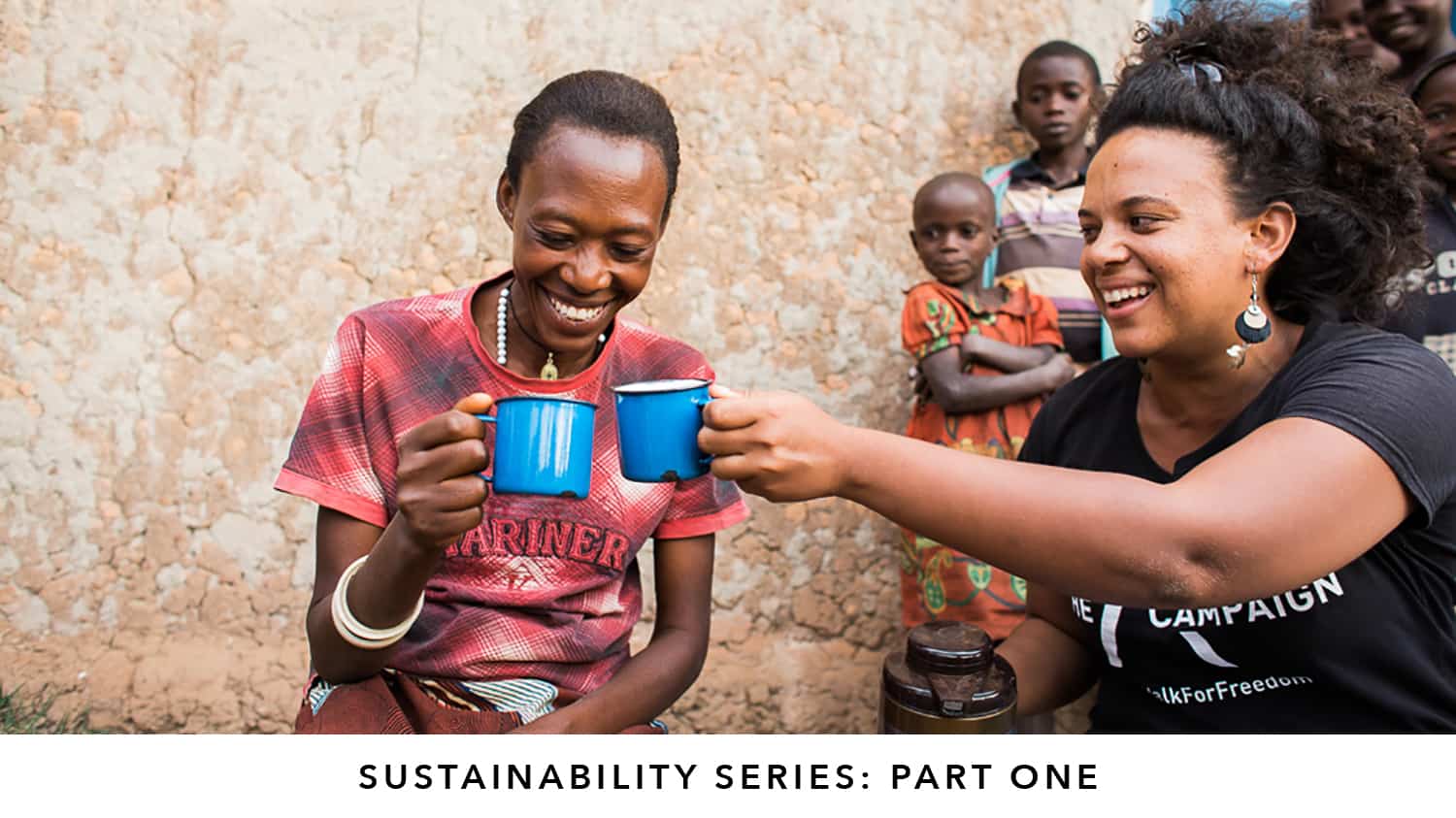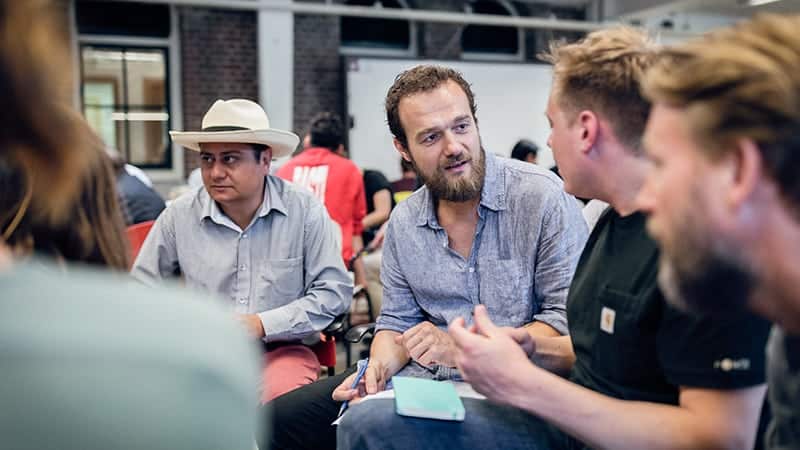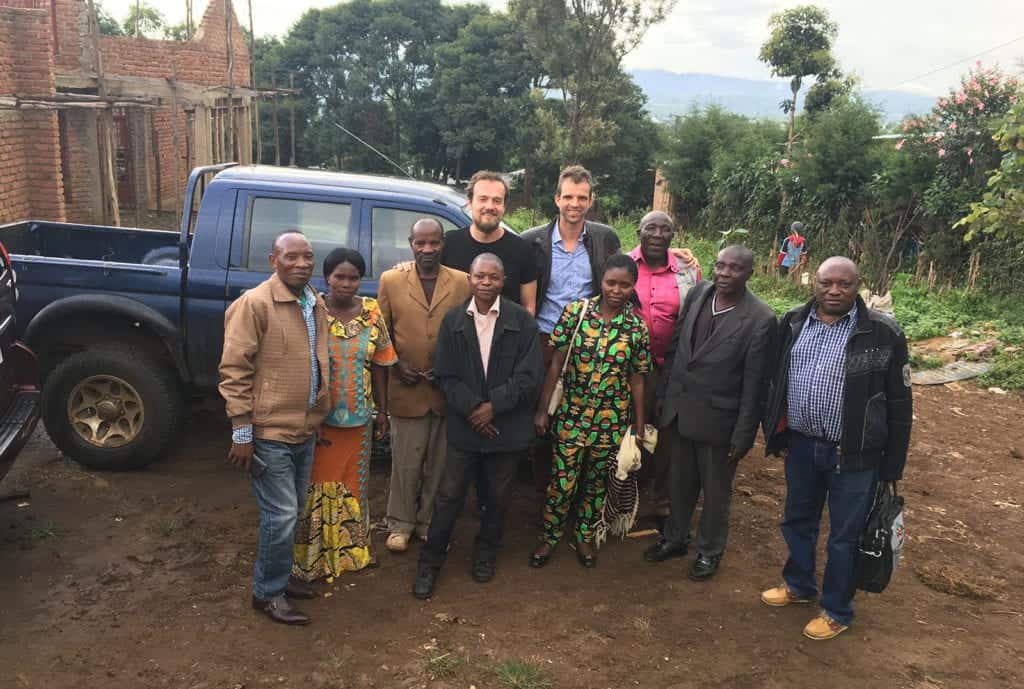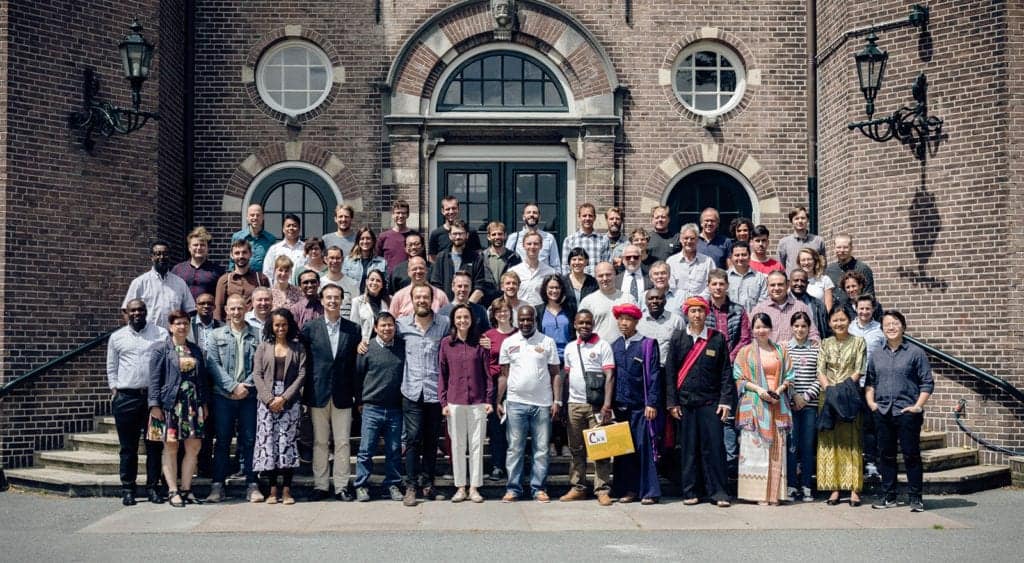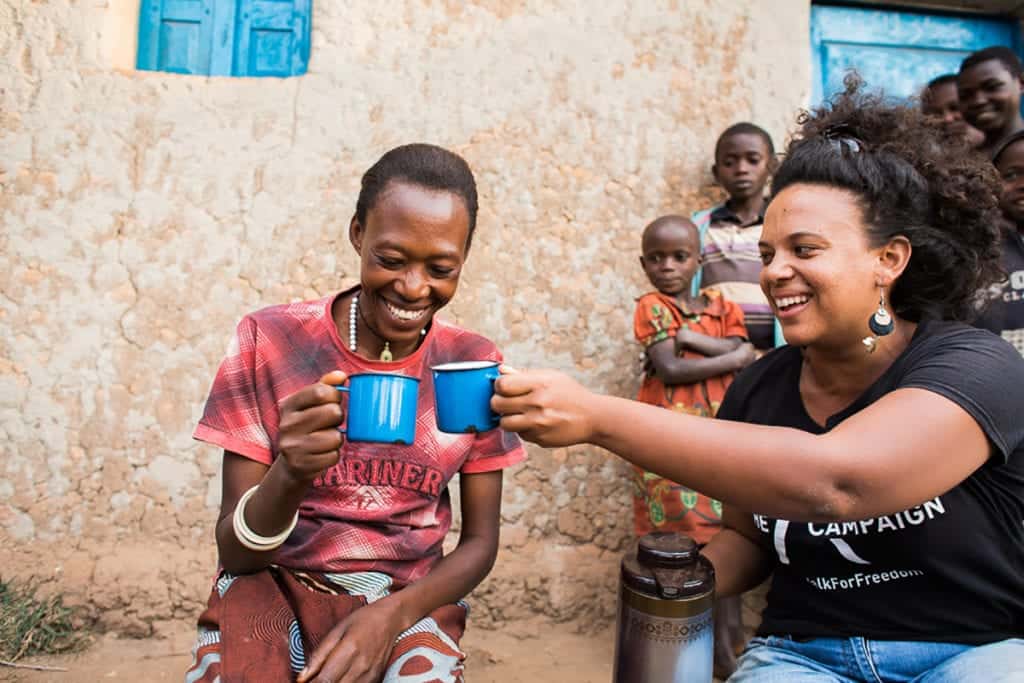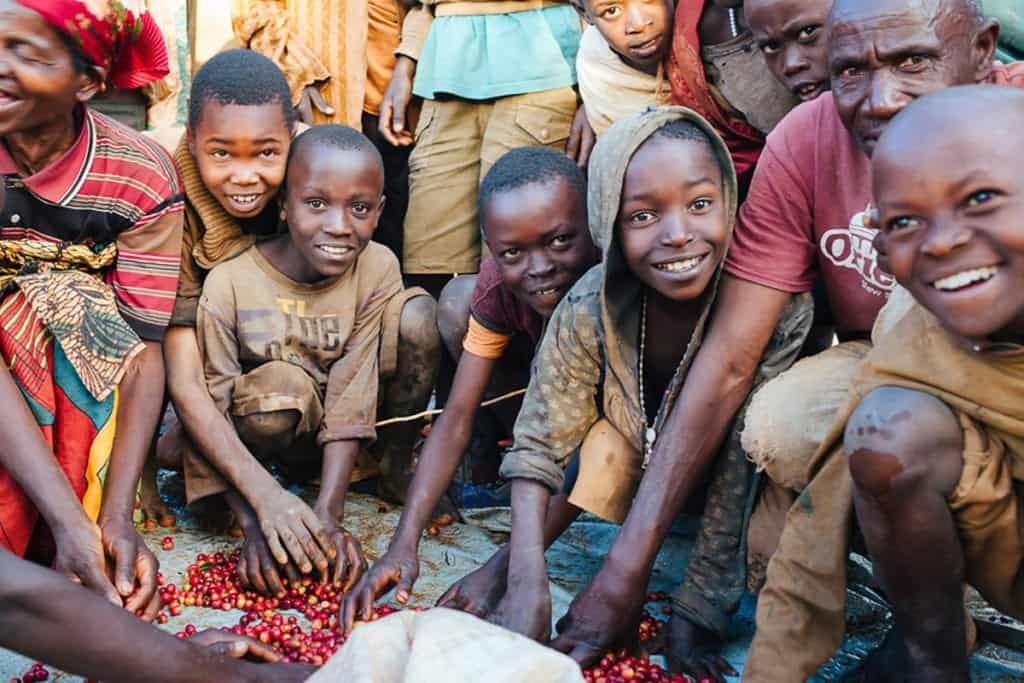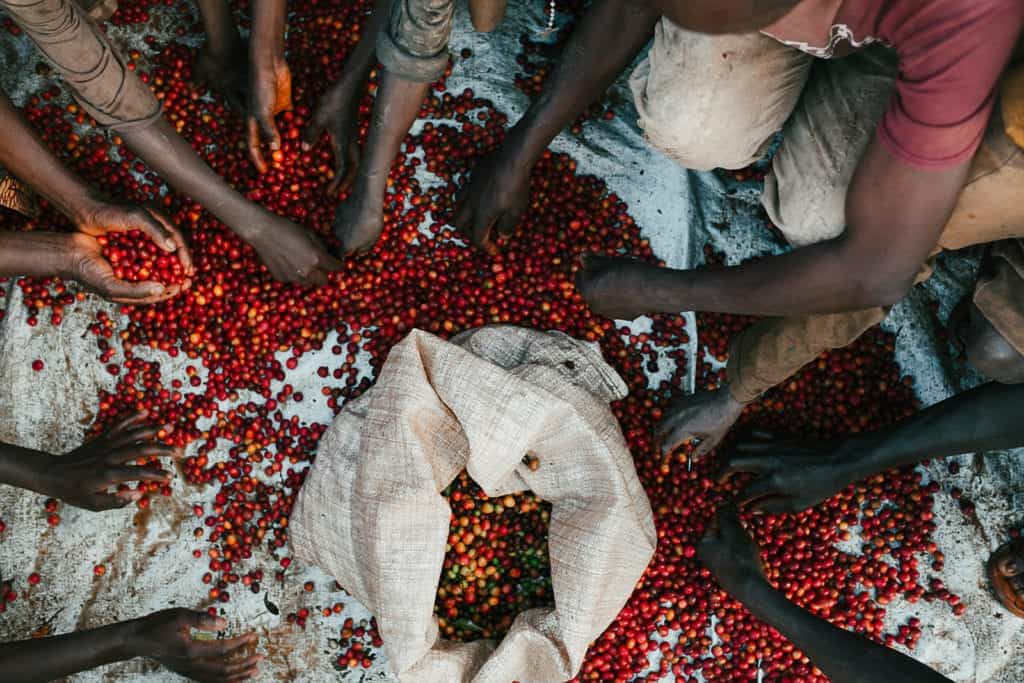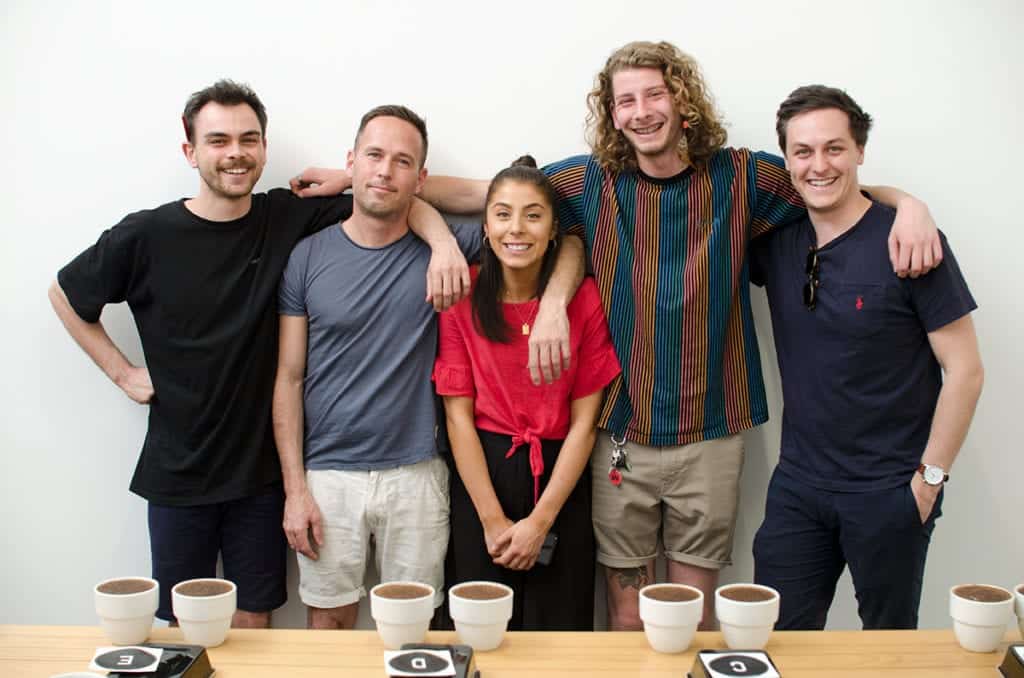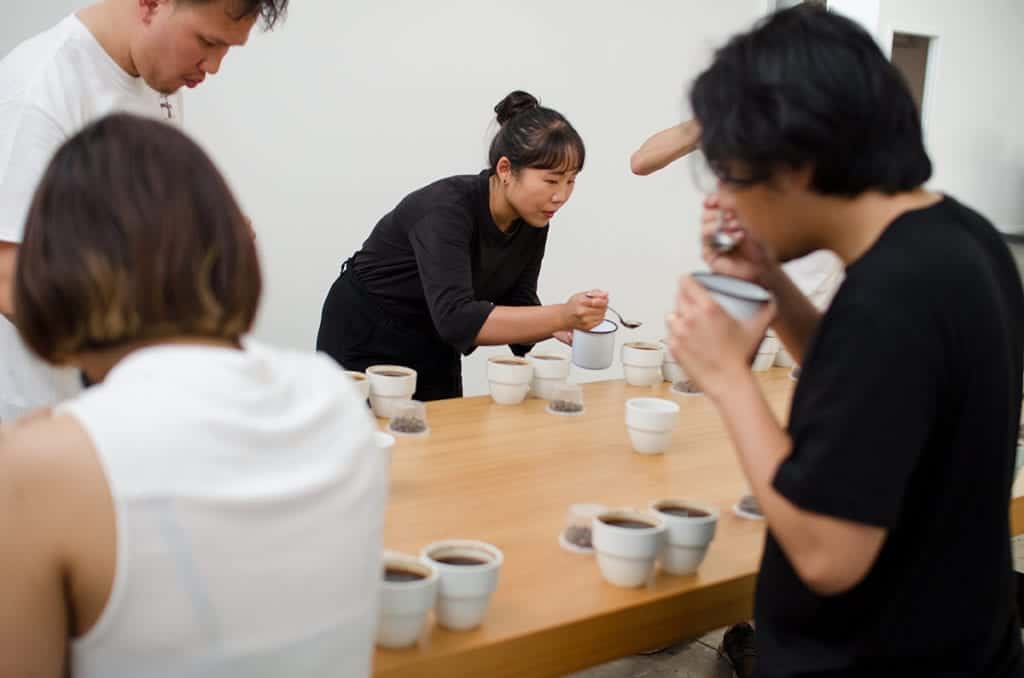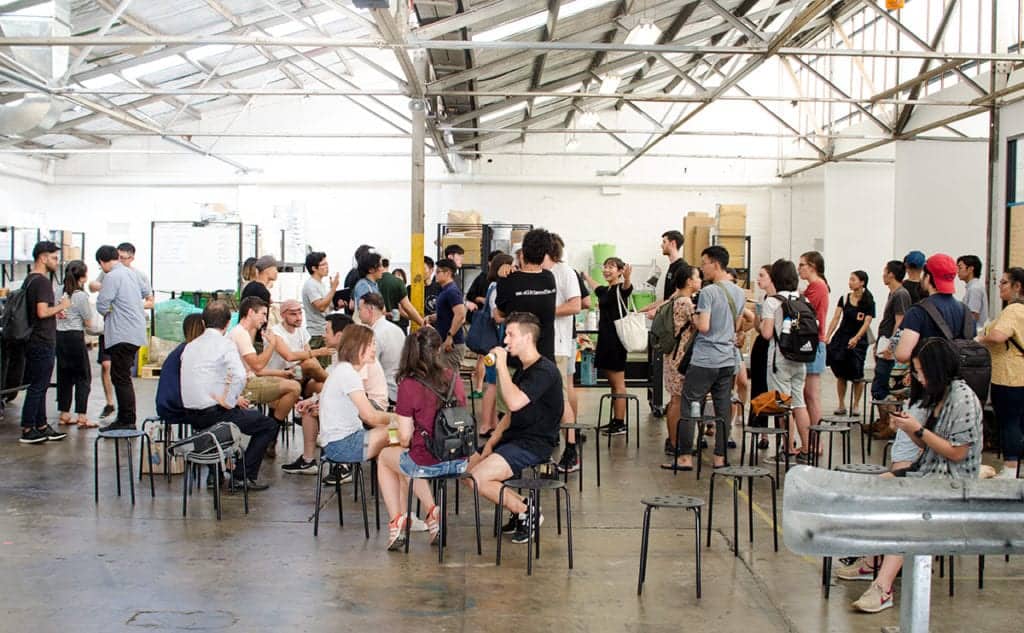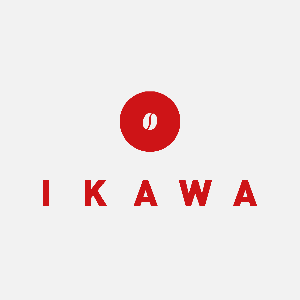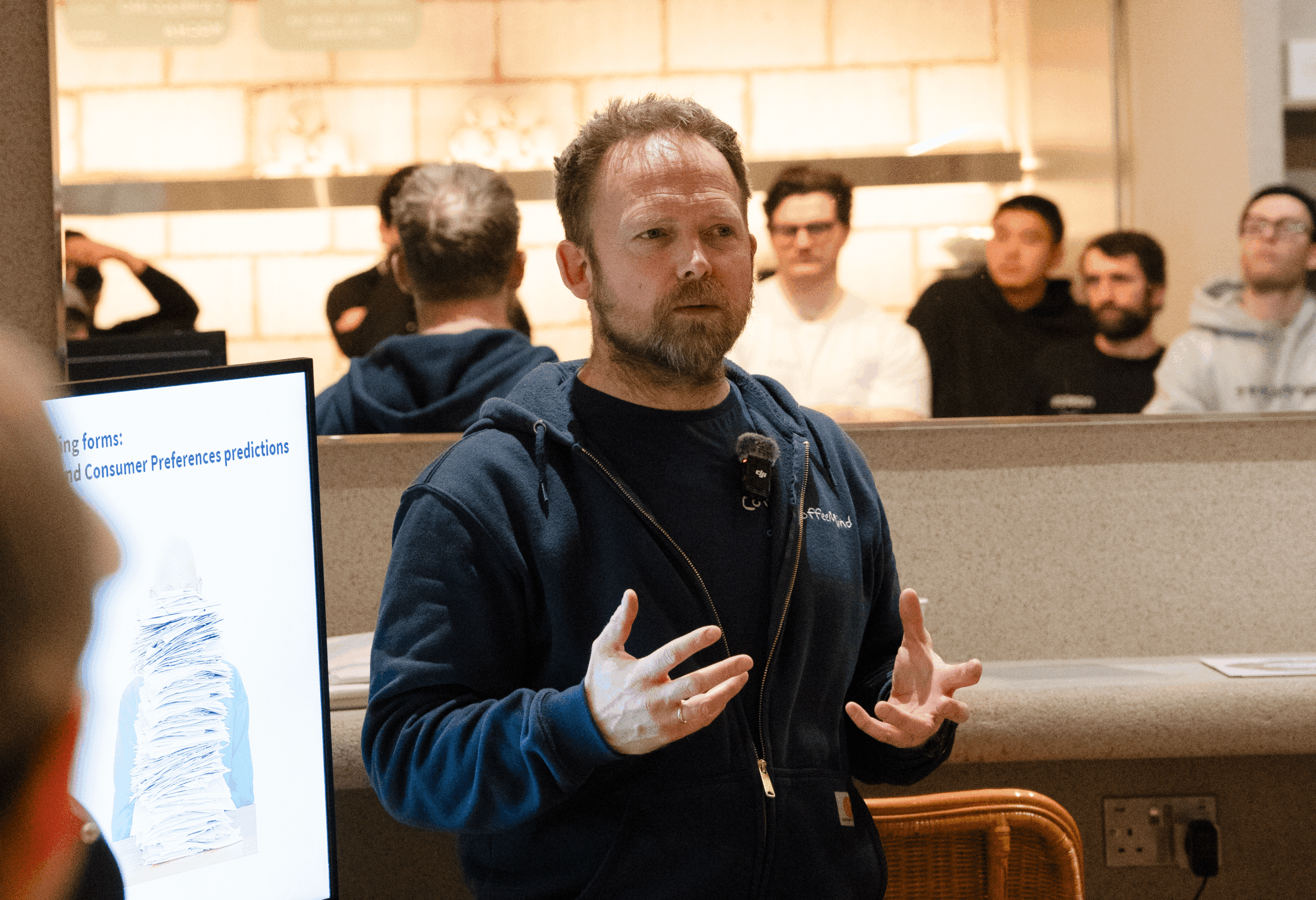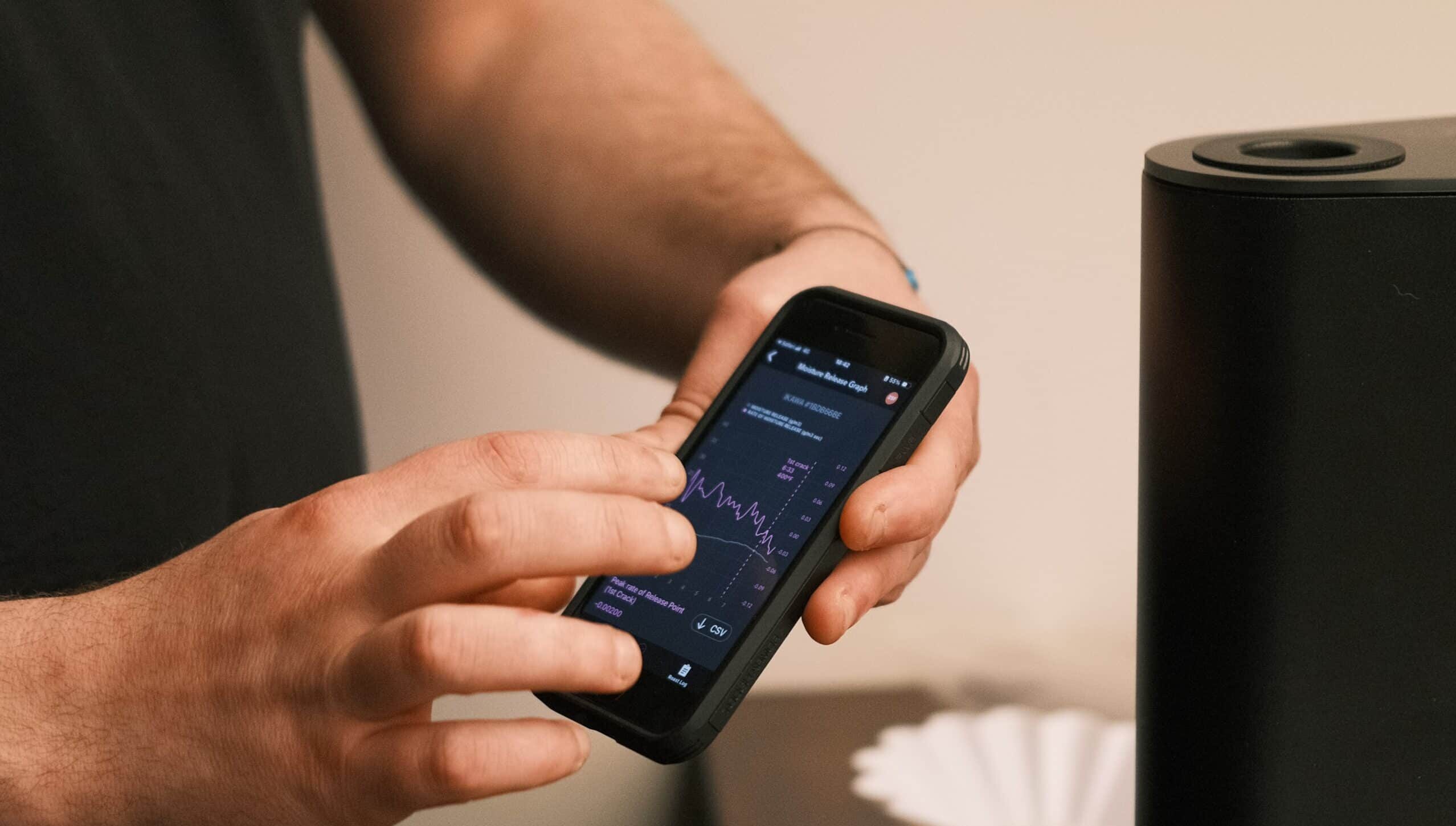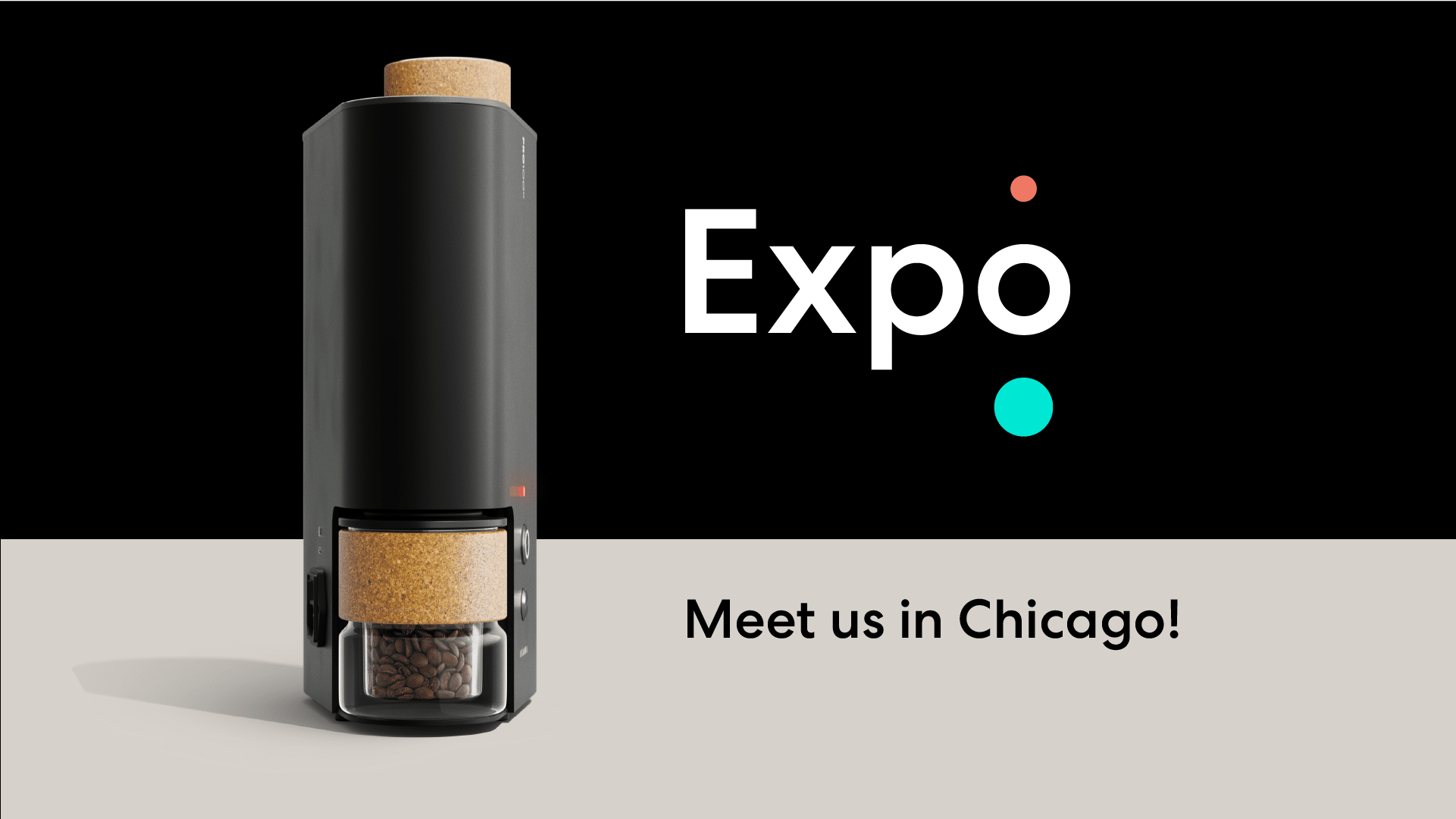In this first post, we profile three community building companies: This Side Up, Long Miles Coffee, and Bureaux Collective. Community is vital to the social, economic, and environmental health of the coffee supply chain; it is a space wherein knowledge is developed and shared among members who fundamentally support each other’s well-being. Through the sharing of knowledge and in working toward common goals, these communities and their members are exemplary models for how people can work together to meet sustainability challenges and create better business environments.
This Side Up
Many specialty coffee professionals have unexpected backstories as to how they entered the industry, such as This Side Up founder Lennart Clerkx. In 2010, Lennart was completing business studies in social entrepreneurship in Copenhagen when his agroforestry-related internship in Madagascar was abruptly ended by a coup d’état. Forced to seek out other opportunities, Lennart landed a marketing internship for Ngorongoro Mountain Coffee Estate in Tanzania, in 2011—the beginning of his foray into the coffee world.
Ngorongoro provided Lennart a stimulating work environment and increased opportunities for social impact, which inspired him to stay with the company and learn more about the industry months after his internship ended. At the end of his stay, Lennart was committed to starting a coffee business with the purpose of connecting smallholder coffee producers directly with roasters, and in 2013, he founded This Side Up (TSU) .
Lennart’s founding mission for TSU centred on development: he wanted the company to act as a “conduit between producers and roasters”. He aims to create a platform for producers and roasters to exchange information and work closely with one another to trade coffee themselves.
Lennart soon realised that to fully actualise his vision, TSU had to become a green coffee importer. As an importer Lennart has maintained his commitment to fostering relationships and community. Although many specialty coffee traders emphasise the importance of long-term relationships between producers and roasters, the quality and uniqueness of the coffees themselves are often the first priority. In TSU’s case, “…quality is a prerequisite for the start of all our relationships in origin…[the] goal is to get roasters involved in development, through a broader understanding of quality…”. For the TSU team, the concept of quality in the coffee business includes being empathic, creative, and sharing knowledge.
The TSU community has developed simple yet innovative ways of building its global community. TSU has excelled in networking producers who share their same vision across vast geographical distances.
One of their most successful ways of connecting global producers has been through Lennart’s creation of WhatsApp groups. These digital communities enable producers to collectively identify and discuss key issues, which include processing techniques, sharing their experiences with different kinds of technology and equipment, and trade news.
In a similar way that producers exchange knowledge and best practices about processing through WhatsApp, roasters share and troubleshoot roast profiles with one another through WhatsApp. Many of the producers are IKAWA users, or have access to one, and this digital community allows everyone access to relevant roast profiles and advice, no matter their location.
As TSU moves forward, Lennart hopes to initiate more exchanges, particularly between producers and roasters. He sees IKAWA’s potential to facilitate this goal as their technology becomes more widespread amongst producers. As producers and roasters begin to create a common language about quality through roasting technology, Lennart sees the potential for development-focused coffee business. To this end, TSU has begun facilitating roaster exchanges at origin with the purpose of having roasters assist cooperatives in setting up cupping and quality control labs. In another more environmentally focused initiative, TSU consults roasting and coffee retail businesses on how to turn waste into new products.
While Lennart admits that there are challenges navigating a business path centred on development, he is optimistic for TSU’ s forthcoming projects. Expect to see more knowledge-sharing endeavours in TSU’s future.
Long Miles Coffee
Lauren Rosenberg’s (Managing Director), journey with Long Miles Coffee started in 2012 with an invitation from Ben and Kristy Carlson to visit them in their new home of Burundi. Lauren was already an avid reader of the Long Miles blog, where Kristy chronicled her experience raising a young family in the heart of East Africa, and she wanted to see whether or not Burundi was as “crazy and beautiful” as Kristy described. Her visit was transformative, and Lauren, who received an opportunity to do a PhD in development studies at the end of 2012, decided to make Burundi the site for her dissertation research.
Lauren moved full-time to Burundi in 2014, and with the help of Ben, focused her research on the following question: “How do you make roasters problems farmers’ problems, and farmers’ problems roasters’ problems?” The work that followed became the impetus for the Coffee Scouts program, which has become the crux of Long Miles’ operations: fostering community between roasters and farmers.
The Coffee Scouts program was conceived in response to a technical problem facing producers and roasters: how to manage the potato defect. The program is made up of local community members living near Long Miles washing stations and their mandate is to teach coffee farmers how to increase coffee tree productivity, while managing the antestia bug—the insect that transmits the bacteria causing the “potato defect/taste” in coffee. Initially funded by roasters’ donations, the Scouts have become a cornerstone of Long Miles’ business strategy. Today they are instrumental to Long Miles’ community development, which is at the core of the company’s long-term vision.
The Coffee Scouts program highlights the importance of community members identifying their own needs: Long Miles’ management team identified a technical issue that needed to be addressed, while the farmers who interacted with the Scouts saw community leadership. For example, in the Coffee Scouts’ first campaign in 2014, they sought to educate farmers on pruning their coffee trees. At first, the farmers were apprehensive as to why the Long Miles staff were interacting with them outside harvest season, but the Scouts encouraged farmers to interact with them post-harvest, subsequently equipping them with the skills and knowledge to prepare their plantations for better crops.
Trust has grown between farmers and Long Miles through the Scouts program, providing the team with an eye for what farmer members need most: an open forum for exchanging knowledge. By the end of 2015, the Scouts program expanded to include “Farmer Friends”—an extension that trained farmers to educate their neighbours in the same agronomic practices taught to them by the Scouts. With neighbours training neighbours through Farmer Friends, alongside community members receiving good and stable jobs as Coffee Scouts, the Long Miles community is flourishing. Permanent improvements to agronomic practices is becoming even more visible today.
An ongoing challenge for specialty coffee communities like Long Miles, which are based at origin, is how to ensure that roasters can take part as actively within the community as their members at origin. Like This Side Up, Long Miles views IKAWA technology as a bridge between origin and roasters through the open sharing of roast profiles. Additionally, the IKAWA roaster is currently Long Miles’ primary means of quality control.
As is the case for cafes working to maintain a well-trained staff of baristas, it can be challenging for an exporter to keep a well-trained team of quality control staff. For Long Miles, the ease with which the IKAWA roaster can be utilized by a first-time user has been invaluable in maintaining quality control measures within an often-changing organization. According to Lauren, IKAWA’s main asset is that “non-[roasting] experts can execute a task that improves quality”. For these communities whose livelihoods depend on coffee, IKAWA’s tools provide easy, efficient, and reliable methods for managing quality control.
Bureaux Collective
Bureaux Collective launched in 2016 in response to the steep barriers to entry facing a growing number of Melbourne coffee professionals and cafe owners who were interested in starting up their own roasting program. Although primarily financial, these barriers included a lack of know-how and a fiercely competitive market. Tim Varney and Tim Williams, Bureaux Collective’ s well-accomplished and deeply experienced roasters and co-founders, saw an opportunity to develop a community of roasters who could bring fresh perspectives and new ideas to a market dominated by large established companies.
Bureaux currently has 25 members from its original group, confirming that its services are well-tailored to meet the needs of Melbourne’s start-up roasters. Three of its members joined with the express ambition of having their own roastery and have gone on to do so, while others who have participated since the beginning have now grown to a volume where they can sustain their own roasting spaces. But there are some key benefits to being a Bureaux member beyond the use of their roasting facilities. According to Tim Williams, training, quality control, and ongoing support are key incentives for membership. Bureaux members benefit from learning from each other’s experiences, exchanging ideas, and fostering community amongst new and small business owners who often feel isolated.
Within Melbourne’s roasting scene, Bureaux Collective stands out as being “pretty out there,” according to Tim. The city’s coffee scene is dominated by brands, secret blends, and espresso, above all else. He further explains that, “…[Melbourne’s] espresso culture, which [leads its] cafe culture, completely came up out of Italian immigration in the 50s, and in a lot of ways is still very much there. You’d pick a roaster and they’d put machinery in and you sign a 2-3-4-year deal and they’ll bring you coffee every week…that’s the sort of level in which [a cafe] engages with [coffee].” He adds that there is a lot of secrecy to this type of coffee culture–consumer knowledge about cafes is high, but low with respect to coffee itself.
In contrast, Bureaux Collective is pushing for and exemplifying the benefits of transparency in its coffee community. They want cafes with roasting ambitions to feel that they can own their brand, provide their customers with unique experiences, and be able to educate the market about what coffee really is. The Bureaux Collective team view themselves as a platform for generating new ideas and perspectives on coffee. Transparency and sharing is at the core of their business model: members share a Cropster account and the company utilizes IKAWA roasters for all its sample roasting. Tim believes that roasters should not be fearful of sharing roast profiles, and that these should be seen as a mere starting point for how to approach a coffee. The loyalty of many of Bureaux ‘s original members and continued growth of new members suggests that an increasing number of Melbourne’s coffee community members support Bureaux’ s vision of transparency.

